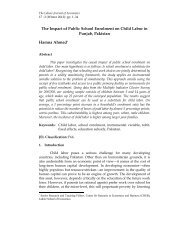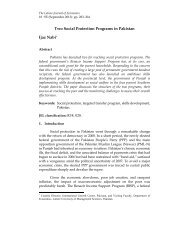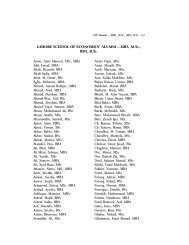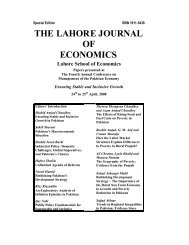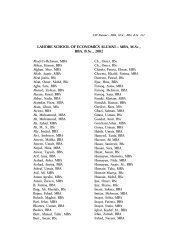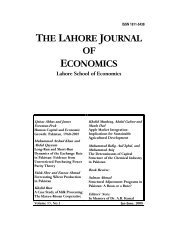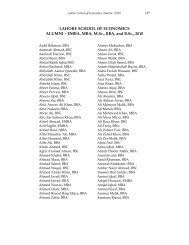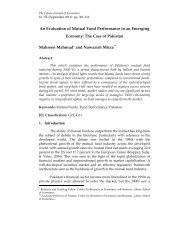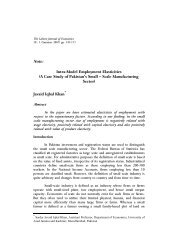Special Edition-07.pdf - Lahore School of Economics
Special Edition-07.pdf - Lahore School of Economics
Special Edition-07.pdf - Lahore School of Economics
Create successful ePaper yourself
Turn your PDF publications into a flip-book with our unique Google optimized e-Paper software.
154<br />
Naheed Zia Khan<br />
world dominated by trade, the rules <strong>of</strong> the World Trade Organization<br />
(WTO) prevail. These rules are the outcome <strong>of</strong> the Uruguay Round (UR)<br />
<strong>of</strong> trade talks. The UR began in 1986 and culminated in converting the<br />
‘interim’ Secretariat <strong>of</strong> the General Agreement on Tariffs and Trade<br />
(GATT) into the WTO. The UR was the eighth round <strong>of</strong> GATT and it<br />
included agriculture and services in the trade talks for the first time. 1<br />
With 150 member countries in January 2007, the WTO enforces the<br />
1993 UR agreement; the Agreement on Agriculture (AoA), the General<br />
Agreement on Trade in Services (GATS), the agreement on Trade Related<br />
Intellectual Property Rights (TRIPs) and Trade Related Investment<br />
Measures (TRIMs). The members are required to abide by the WTO rules<br />
which are prolific, running into thousands <strong>of</strong> pages. Following an aborted<br />
attempt in Seattle in late 1999, the Ministerial Meeting <strong>of</strong> the WTO in<br />
Doha, the capital city <strong>of</strong> Qatar, launched the next comprehensive round<br />
<strong>of</strong> multilateral trade negotiations in November 2001. The Doha Round<br />
aims at reducing tariffs, subsidies and other barriers to global commerce<br />
in order to boost progress, apparently, in the underdeveloped parts <strong>of</strong> the<br />
world. Like its predecessor, the UR, agricultural subsidies remain the<br />
sticking point also in the Doha Round <strong>of</strong> trade talks, causing the<br />
suspension <strong>of</strong> the process in July 2006, as the multilateral negotiation on<br />
this thorny issue failed to reach agreement even after a five-year effort.<br />
There is a broad range <strong>of</strong> issues that are <strong>of</strong> important concern for<br />
economic reforms in developing countries such as Pakistan. One key issue<br />
relates to the extent to which they have so far benefited from the UR<br />
reforms, most notably the commitments to liberalize trade in agriculture.<br />
In the wake <strong>of</strong> the break down <strong>of</strong> the trade talks in July 2006, this study<br />
takes a hard look at developments in agricultural policies since the UR<br />
agreement. The analysis is divided into four parts. Part 1 discusses the<br />
importance <strong>of</strong> agriculture in Pakistan’s economy relative to the economies<br />
<strong>of</strong> selected Asian and African countries. Part II presents the estimates,<br />
found in the literature, <strong>of</strong> the welfare gains from removing trade barriers<br />
globally. Pakistan’s performance in reforming its agricultural sector is also<br />
discussed in this part. Part III analyzes the size and significance <strong>of</strong> the<br />
developed countries’ farm subsidies in the Post-UR agreement period.<br />
Finally, before presenting the conclusion <strong>of</strong> this study, Part IV discusses<br />
the factors relating to agricultural subsidies hindering the reform efforts in<br />
developing countries.<br />
Part I<br />
1 The earlier Rounds were Geneva 1947; Annecy 1948; Torquay 1950; Geneva 1956;<br />
Dillon 1960-61; Kennedy 1964-67; and Tokyo 1973-79.



